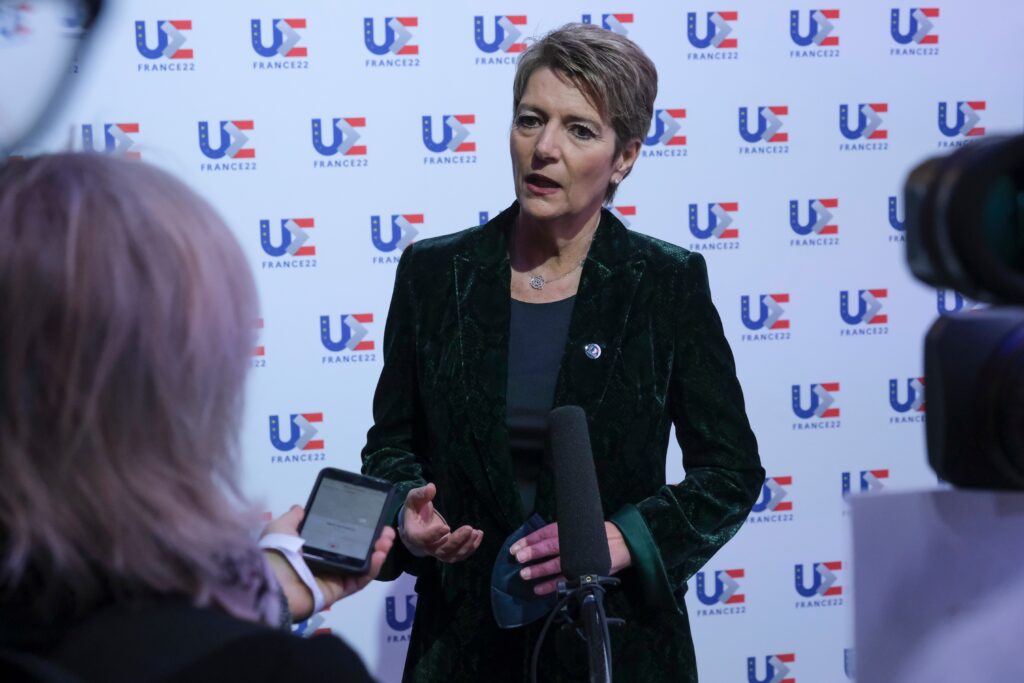Recent talks between Switzerland and the United States on high trade tariffs ended without a deal. Still, Swiss President Karin Keller-Sutter called the meetings with U.S. officials Scott Bessent and Jamieson Greer both “friendly and productive.” The goal was to start setting the stage for full customs duty negotiations, which could begin soon.
Keller-Sutter met Bessent, the new U.S. Treasury Secretary, to address the 31% tariff on Swiss goods. This tariff was part of former President Donald Trump’s trade policy. It still affects Swiss exports, while many other nations now face lower duties.
The Swiss president said she felt “frustrated” that the talks didn’t produce fast results. Still, she remained hopeful. She pointed to a coming weekend meeting in Geneva between the U.S. and China as a chance for progress.
A Friendly Tone and a Bit of Humor
Despite the lack of a breakthrough, Keller-Sutter described the meetings as encouraging. She noted a shift in the U.S. tone and said there were signs Washington may be ready to compromise. At one point, she even joked with Bessent, referring to the newly elected Pope Leo XIV, who is U.S.-born. “The Holy Spirit visited Rome; I hope he comes to Geneva this weekend,” she said with a smile.
High Tariffs Put Swiss Exports at Risk
The 31% tariffs remain a major problem for Switzerland. They put the country at a disadvantage compared to the European Union. EU members may face only 20% tariffs, giving their exports an edge.
The tariffs were first announced in 2020, during Trump’s push for “reciprocal trade.” That policy aimed to pressure trading partners to lower their own tariffs or face U.S. penalties. While many countries had these tariffs lifted, Switzerland did not.
Keller-Sutter reminded reporters of her April 9, 2020 phone call with Trump, just a week after he announced the plan. After their talk, Trump delayed the tariffs for 90 days and lowered new ones to 10%—but not for China.
Swiss Investment as a Talking Point
In her recent meetings, Keller-Sutter used Swiss investment in the U.S. as a key argument. She noted that Swiss firms support 400,000 U.S. jobs and pay workers an average of $130,000 per year.
She also said she told Trump in 2020 that the tariffs seemed unfair. Asked if she believed the call changed his mind, she said with a grin, “He should listen to women.”
U.S. and China Step into the Picture
The broader trade picture also includes rising tension between the U.S. and China. Ahead of the Geneva summit, the U.S. raised tariffs on Chinese imports to 145%. China answered with 125% tariffs on U.S. goods. This has created a tense climate ahead of the weekend talks.
Neither side revealed where their Geneva meeting will happen. The Swiss city has a history of hosting key global talks. In 2021, President Biden met Russian President Putin there before the Ukraine war.
Some experts think that if the U.S. and China can find common ground, other nations—like Switzerland—might also benefit. A wider trade shift could lead to new openings.
Social Media Clues and Hopes for Peace
Meanwhile, Trump posted a hint online that he might soon cut tariffs. “80% Tariff on China seems right! Up to Scott B.,” he wrote, referring to Scott Bessent. This leaves room for change, but uncertainty remains.
Keller-Sutter also held a talk with China’s envoy to Switzerland. She said it was a routine meeting, but the timing shows how active Geneva has become as a place for trade and diplomacy.
Switzerland Wants a Fair Deal
In summary, while there’s no deal yet, Switzerland continues to push for fair treatment. Keller-Sutter remains firm but calm, hopeful but realistic. Her efforts show that smaller nations can still speak up on the world stage.
As negotiations move forward, eyes will stay on Geneva, where world leaders gather to shape global trade. Switzerland hopes that with reason, diplomacy, and maybe even a little divine help, a deal will finally be made.


